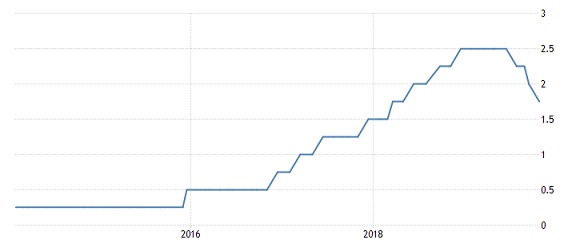
Argentina has been chronic debt-defaulter and currency hyper-inflator for a long time. Last year, they offered 100-year bonds at an attractive interest rate and sold billions of them. Less than a year later, they are teetering on default of these bonds and all kinds of money managers around the world are caught with catastrophic losses. How did this happen?
Since 2008, interest rates around the world have been artificially lowered to boost economies. (For example, the U.S. Federal Reserve’s Fed Funds Rate 48-year average is 5.64%, but today you can see in the chart that they are 1.75%). Now, over 10 years later, short-term interest rates are still near zero and many government bonds in Europe are being issued with a negative interest rate. As a result, professional investors at pension funds, endowment funds, insurance companies, and other financial institutions have been desperate to find a speck of return to meet their payment obligations. Without normalized interest rates, they are in colossal financial trouble. Hence, when a 3rd-rate country run by socialists known for hyper-inflating their currency and defaulting offers a bond with a decent interest rate – even the professional managers lose all sobriety and recklessly jump on some Argentine bonds.
One of the many consequences of these prolonged artificially low interest rates is struggling pension funds. From the states of Illinois and Connecticut to the country of Netherlands, pension benefits are becoming imperiled. For example,
- Netherlands is forced to buy zero-interest government bonds so they now must either raise their pension contributions by 30% or reduce the pension payouts.
- The maximum Full-Retirement pension in the UK is capped today at a pitiful $10,354 per year.
- Connecticut state pensions are only 46% funded
- Illinois state pensions are only 38% funded
As these troubled fund managers panic for growth, they are more inclined to gamble on foolish investments, like Argentine bonds, that just lead to more losses. Artificially lowered interest rates have been transferring trillions in wealth from savers (individual and corporate) to the largest borrowers – government treasuries, banks, and corporate borrowers. It is a horrible environment for safe investing for a reasonable return and I expect more trouble for institutions that rely upon bonds and savings instruments in their business model.
